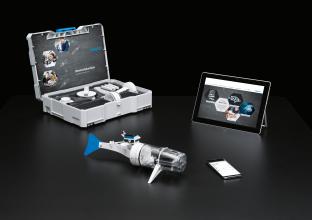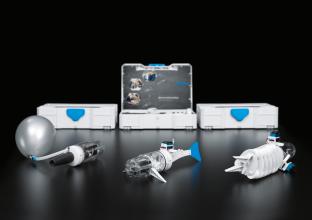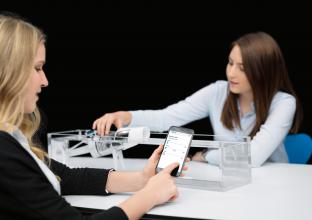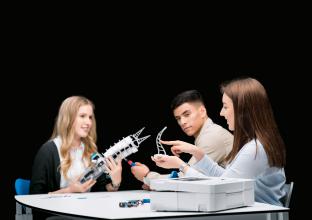
Bionics4Education: Generating enthusiasm for MINT
At the Hannover Messe trade fair, Festo is for the first time presenting a bionic didactic concept that unites digital and analogue learning. The objective is to generate enthusiasm among children and adolescents for the natural sciences and technology (MINT). This concept appropriately interlinks bionics and technical education – in the form of a kit for experimenting and learning.
An integral education concept
Bionics4Education was developed by an interdisciplinary team of engineers, designers, computer scientists and biologists from the Bionic Learning Network, together with the experts from Festo Didactic as an educational supplier. The objective is to use projects inspired by bionics in order to get young people enthusiastic about the MINT subjects (mathematics, computer science, natural sciences and technology) and about working with bionics. The didactic concept comprises both a learning kit (bionics kit) for practical and solution-based learning, and a digital learning environment.
Bionic work didactically prepared
The Bionics Kits are mainly intended for pupils from comprehensive schools aged 14 to 18 years. The first Festo bionics learning kit, which is to be launched on the market in 2018, contains the construction materials required for three different bionics projects: the Bionic Elephant’s Trunk, an adaptive gripper with Fin Ray Effect®; the Bionic Fish; and the Bionic Chameleon Gripper. Each kit is fitted out with small servo motors, electronic components and plastic elements such as Fin Ray® structures. The students are set the task of combining these with materials they select themselves, in an imaginative and appropriate way. Cable fasteners, small sandbags, cardboard and foam material are just some of the elements that would be suitable for creating highly individual, reusable model variants. Children and adolescents can learn in a playful way to build their own animal robots inspired by nature, and then to operate them by remote control via interfaces on a PC or a mobile device such as a smartphone.
The hardware is supplemented by a digital learning environment with further content relating to bionics and some helpful tips for practical implementation at school or at home. The students can also find out more about the working methods of the Bionic Learning Network team on the website www.bionics4education.com. This content, which is free of charge, helps pupils in constructing and programming the models, and also provides teachers with biological and methodical background material. This didactic material was designed with the support of Festo Didactic for use in teaching. The objective of the online learning environment is to offer a series of projects inspired by bionics along with supplementary content with which teachers can provide their pupils with a project-based learning experience that puts creativity, innovation and problem-solving skills at the focus of attention.
Open source
The didactic material and information for Bionics4Education are provided as open educational resources. School teachers, along with MINT programme managers or other interested parties, can download content such as CAD drawings and software codes free of charge. The material is available for further processing by creative and committed young people. Components can also be generated on one’s own 3D printer.
MINT: generating enthusiasm for natural sciences and technology
The objective is to generate enthusiasm among children and adolescents for the natural sciences and technology (MINT) – digitally, creatively and in an interdisciplinary approach. Since bionics serves as a link between biology and technology or engineering, this offer is the perfect supplement to any integrated MINT education programme; it also points out career prospects in the MINT professions and related courses of study, thereby providing orientation for a choice of study and career. The bionic education kit turns theory into simple practice – with experimentation that is enjoyable and thus gives rise to motivation and enthusiasm. The interdisciplinary learning content can be integrated into the subjects of biology, physics, computer science and technology in everyday school routine, at project days or at individual events.
Corporate Educational Responsibility®: commitment to technical education
The idea for Bionics4Education arose from the countless preliminary models created during the design phase of individual bionics projects. The learning effects of the bionics engineers were to be not only preserved, but also didactically processed and made available to young people. With this in mind, the modular system was designed as an open source of knowledge. School classes, working groups or inquisitive individual researchers can either launch into bionics with the ready-made kit or organize and build up everything from scratch themselves. In this way, Festo intends to generate lasting enthusiasm for technology among young people, while at the same time promoting up-and-coming technological talent both in Germany and throughout the world. Festo is thus assuming responsibility towards society in the form of Corporate Educational Responsibility® and is showing strong commitment worldwide to youth, technology, science and education.
As the world’s leading supplier of automation technology and the world market leader in technical education, Festo offers training positions, dual study courses, trainee placements and scholarships in areas including computer science, mechanical engineering and electrical engineering. The family enterprise also invests in the quality and sustainability of educational systems and in knowledge transfer, as is shown by major programmes such as the vocational competitions WorldSkills and First® Lego® League or the Festo Education Fund. Through its “Technical Education” unit, Festo provides training courses for students at schools, vocational institutes and universities and systematically prepares them for working in dynamic and complex surroundings.
Bionic Learning Network
Over ten years ago Festo initiated the Bionic Learning Network, which is closely linked to the innovation processes within the company. Festo promotes projects, testbeds and technology carriers in cooperation with students, renowned universities, institutes and development companies. The objective is to put bionics to use in discovering new approaches to technology and in putting them into practice in industrial automation. Festo is now bringing together the world of bionics and the educational sector for the benefit of school pupils, in order to promote the concept of working in interdisciplinary project teams and to foster problem-oriented learning and creativity.
Festo è un attore globale e un'azienda indipendente a conduzione familiare con sede a Esslingen am Neckar, in Germania. Fin dagli inizi Festo ha stabilito degli standard nella tecnologia dell'automazione industriale e nella formazione tecnica, contribuendo così allo sviluppo sostenibile dell'ambiente, dell'economia e della società. Prodotti e servizi sono disponibili in 176 paesi del mondo. L'azienda, infatti, fornisce tecnologia di automazione pneumatica ed elettrica a 300.000 clienti di automazione di fabbrica e di processo in oltre 35 industrie. Il settore LifeTech con la tecnologia medica e l'automazione di laboratorio sta diventando sempre più importante. Con circa 20.600 dipendenti in oltre 250 filiali in circa 60 paesi in tutto il mondo, Festo ha realizzato un fatturato di circa 3,45 miliardi di euro nel 2024. Ogni anno oltre l'8% di questo fatturato viene investito in ricerca e sviluppo, mentre l'1,5 % del fatturato è investito nella formazione di base e di perfezionamento. Festo Didactic SE è un fornitore leader di formazione e formazione tecnica e offre ai suoi clienti in tutto il mondo soluzioni complete di apprendimento digitale e fisico in ambiente industriale.




